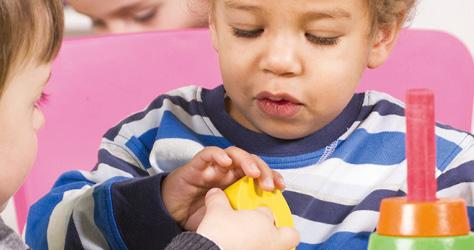Playing is one of the main ways children learn - building their physical, social, emotional and intellectual skills.
Here’s a guide to the best games.
At a glance
- Playing is one of the main ways that children learn
- It is great for their physical, social, emotional and intellectual skills
- Even simple games will keep children happy and stimulated

Whether it’s pouring water, banging saucepan lids or marrying teddy and rabbit, play is one of the best ways for children to learn. It’s important for four main reasons:
- Self-esteem - as they realise what they’re capable of, playing makes toddlers feel good about themselves
- Life skills - kids can practise the skills they'll need as they grow up
- Concentration skills - because it’s huge fun, children often become super focused on what they are doing, helping them learn to concentrate
- Social skills - it’s a great way of perfecting those social skills, as children engage in learning experiences with other children and adults.
Ideas for playing
Even the simplest of games will keep children happy and stimulated, sparking their imagination and unlocking a world of learning. Here are a few simple ideas:
- Playing with sand and water - an early introduction to science and maths, learning that water is fluid, not solid, and that it can be measured in different sized containers
- Playing with dough, drawing and painting pictures, dressing up and playing with dolls - encourages creativity and imagination and helps kids express their feelings
- Building blocks, jigsaws and shape sorters - helps children recognise different shapes and sizes, putting things in order and developing logical thought
- Playing ball games, dancing, running and climbing – these all help develop body movement, strength, flexibility and co-ordination
- Organised games - help kids learn about turn taking, sharing and mixing with others
- Singing and playing simple music instruments - helps develop rhythm, listening and hearing
- Make believe play – you can really fire up their imaginations with simple props, like a mini-kitchen area, with some pots, pans, plastic cups and plates
- Small worlds - organising small-scale road layouts, dolls houses or farms, gives children the opportunity to plan, organise and take charge
- Helping out - when you're washing up, for example, why not let your child join in by washing the saucepan lids.
To grow and develop, children need attention from someone who's happy to play with them, so try and carve out some time each day if you can. Or if you're pushed for time, why not find ways to involve your child in what you're doing - even the housework. Children learn from everything they do so it’s great to make their little worlds as fun and stimulating as you can!
For more great play ideas, visit the Pre-School Learning Alliance.